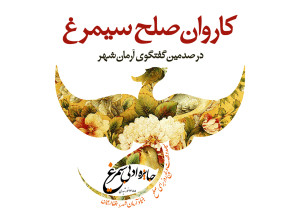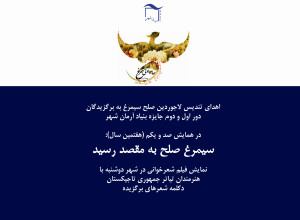A caravan of books leaves; a caravan of affection returns
The 15th anniversary of the establishment of Armanshahr Foundation/Open Asia was celebrated in its 100th Goftegu meeting during which the winners of the first and second Simorgh peace prize were announced. Furthermore, the Ministry of Culture of the Republic of Tajikistan and the National Library of Tajikistan were praised for two decades of publishing services and cultural achievements, respectively. Two thousand books were donated to the National Library.
The National library of Tajikistan hosted the 15th anniversary of Armanshahr on 7 December 2012. During the celebration, Tajik actors performed a play with the title of the Simorgh Peace Caravan based on the winning poems of the Simorgh Peace Prize as well as a selection of poems by well-known poets.[1] More than 100 cultural activists of Tajikistan took part at the meeting, which was covered by the media in Tajikistan as well as the international media, e.g. BBC, Radio Azadi and Radio Zamaaneh.
The play started with “I pray to God for the grapes to ripen,” a poem by Elias Alawi, a winner of the 1st Simorgh Peace Prize. The final sentence of the play created many questions for the audience: “Perhaps we have not realised yet that we are the Simorgh, it is the blessed peace of Simorgh that conquers the hearts; it can be accepted unconditionally as a law.”
The play concentrated on the contrast between peace and war, which kept recurring on the stage. War went, peace came, peace went and war came. Sometimes: “War ended. That was the last news they had heard on the radio. They had returned home in dirty attire/nobody waited for them/nobody said hello/nobody opened the door.” However, there was a reply: “They do not wish to answer your hello/heads are bent into the collars/nobody raises their head to answer and meet friends…” The ending of war does not mean its conclusion. It is the beginning of a cold season during which the past must be redressed. Achieving peace is not the final destination. The consequences of war must be eradicated. “The world must get drunk/the streets must stumble/Presidents and paupers most rub shoulders / the world must get drunk/ the borders must get drunk and Mohammad Ali can meet his mother after 17 years.”
“Drunkenness must spread to objects.” The evil brothers of Joseph must be told: “This was not expected/ throwing in the well, okay, but why kill?” The war films must be watched: “The camera filmed two corpses/the frame was shut and the woman was on the other side of the window.” One must be concerned with the war to protect peace: “Don’t go out, the gutters are not void of blood, my blood is flowing where your blood is flowing where his blood is flowing.” We should not forget that: “Mother was still whispering, don’t say anything, silence was medicine as well as sickness.”
The whole text of the play was not as bitter as this, especially when sisters and brothers from the three corners of this great lingual geography came together and joined hands, “without the Earth going crazy and the Heaven falling apart,” when they cried out: “There are a thousand Khorassans in my heart,” and “the rain washed away the 40-day grief/ it washed clean my heart and eyes/ it washed every window/ it washed the mirror of my heart/Ringing passed the rain/ agile and young passed the rain.”
Despite all the joy and grief, all the peace and war, the truth was still the final sentence of the play: “Perhaps we have not realised yet that we are the Simorgh, it is the blessed peace of Simorgh that conquers the hearts; it can be accepted unconditionally as a law.”
After the play, two special sculptures were awarded to the Ministry of Culture and the National Library of Tajikistan. Subsequently, Ms Golrokhsar Safi Ava, mother of the Tajik nation, spoke sweetly about 15 years of Armanshahr’s activities. She described Armanshahr as an institution that had stood by the people of Tajikistan in the most difficult days of the suffering land.
The caravan of 2,000 books of Armanshahr, thousands of poems and stories of solidarity and common language went to Tajikistan and returned to Kabul as a caravan of affection, memories, friendships, and love and set up its 101st meeting with a good number of the people of pen, poetry and literature.
On 17 December 2012, the participants of the meeting at the Culture and Civil Society Foundation in Kabul heard a report about the 1st and 2nd Simorgh peace prizes, when the statutes of Simorgh and plates of honour were awarded to the winners. They then watched a film of the play performed in Tajikistan.
The Simorgh Peace Prize also issued a press release:
Press release
9 December 2012
Armanshahr/OPEN ASIA
Winners of the 1st and 2nd Simorgh Peace Prize named
Armanshahr Foundation/OPEN ASIA founded the Simorgh Peace Prize in 2009 with the motto “We want peace 365 days a year, not a day less, but a day more!”
The first call of the Simorgh Peace Prize to poets and writers on 15 September 2009 asked them to send their works to the Secretariat on the following topics:
- Victim: victims of the recent tumults, conflicts and wars
- Torture: physical, sexual, psychological and social ill treatments
- Rejection of war: violence and militarism
We received about 1000 works from the Persian-language writers and poets from all over the world for the 1st Simorgh Peace Prize.
The 2nd Simorgh Peace Prize was specified for non-governmental publishers in Afghanistan, who were asked to send in samples of their titles to the Secretariat.
On Friday, 7 December 2012, the 100th Goftegu public debate meeting of Armanshahr Foundation, marking 15 years of its operation, was held in Dushanbe in Tajikistan, where winners of the 1st and 2nd Simorgh Peace Prize were announced. At this meeting, Tajik artists staged a play and recited poems, and special prizes were awarded to the Ministry of Culture of Tajikistan in praise of its publishing services in the past two decades and the National Library of Tajikistan to highlight its significance. Also 2,000 books were donated to the National Library of Tajikstan.
Winners of the 1st Simorgh Peace Prize are:
– Elias Alawi in the Afghanistan Poetry Category for the poem “I pray to God for the grapes to ripen”
– Seyyed Mehdi Moussavi in the Iran Poetry Category for the poem “Those dark clouds and these shadows are ominous”
– Aman Pouyamak in the Afghanistan Story Category for the story “No harm in trying”
– Hossein Shekarbeigi in the Iran Story Category for the story “There was the war”
Furthermore, 10 people were praised: Ms. Zahra Hosseinzada (Afghanistan), Mr. Amanollah Mirzaei (Afghanistan), Mr. Sohrab Sirat (Afghanistan), Mr. Ebrahim Amini (Afghanistan), Ms. Zahra Zahedi (Afghanistan), Ms. Sanaz Beheshti (Iran), Mr. Vahid Talat (Iran), Ms. Mona Shojaei (Iran), Ms. Sadigheh Bastani (Iran), and Mr. Javad Kelidari (Iran)
The winning publishers of the 2nd Simorgh Peace Prize are:
– Erfan Publishing House for books on literary critique and research, poetry, stories and history
– Taak Publishing House for publishing stories and focusing on the new generation of writers
– Qalam Publishing House for publishing poetry anthologies and focusing on ethnic languages spoken in Afghanistan, in particular the non-official languages
The call for the 3rd Simorgh Peace Prize will be published soon.
Armanshahr Foundation is an independent non-profit making citizenship organisation that is not affiliated to any economic, political, religious, and ethnic group or any government. We endeavour to create the foundations appropriate for achieving social demands geared to democracy, human rights, justice and rule of law; take cultural initiatives and publish books to serve the shaping of collective consciousness of the citizens. Armanshahr Foundation is working toward exchange of ideas and dialogue in the region with the goal of achieving solidarity, peace and progress. Armanshahr Foundation is a member of the International Federation for Human Rights (FIDH)
openasiafrance@gmail.com
http://jayezasimorgh.blogfa.com/
http://www.facebook.com/Armanshahr.OPENASIA?ref=ts&fref=ts
[1]The script was based on the works of poets from Tajikistan, Afghanistan and Iran: Attar of Nishapur, Mehdi Akhavan Saless, Layegh Shir-Ali, Bazar Saber, Golrokhsar Safi Ava, Eskandar Khatlani, Nezam Ghassem, Elias Alawi, Zahra Hosseinzada, Wahid Talat, Ebrahim Amini, Seyyed Mehdi Moussavi, Rooholamin Amini, Hamed Rahmati, Amanollah Mirzaei, Mojgan Sadat, Alireza Labash, Mohammad Ali Siavosh Jonaydi, Zahra Zahedi, Javad Kelidari, Sanaz Beheshti, Sohrab Sirat, Taymour Barghi, and young members of Pierre Jouannon Poetry Workshop. The actors were: Artegh Ghader, Hemmat Khoda Amri Khodayov, Ghanijan Alemov, Molane Najmeddin Ava, Ghadamshah Nazarov, Guissou Jahangiri, Rooholamin Amini, Shourangiz Dadashi, Guissou Mohammad Shayova and students of Mirz Torsanzada Industrial College.
Invitation to 100th and 101st Goftegu Public Debates: 15 years Armanshahr, celebrated with Simorgh peace prize awards




